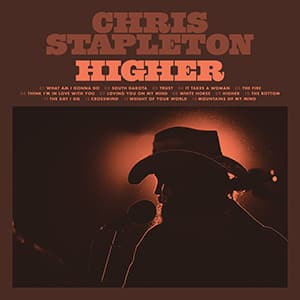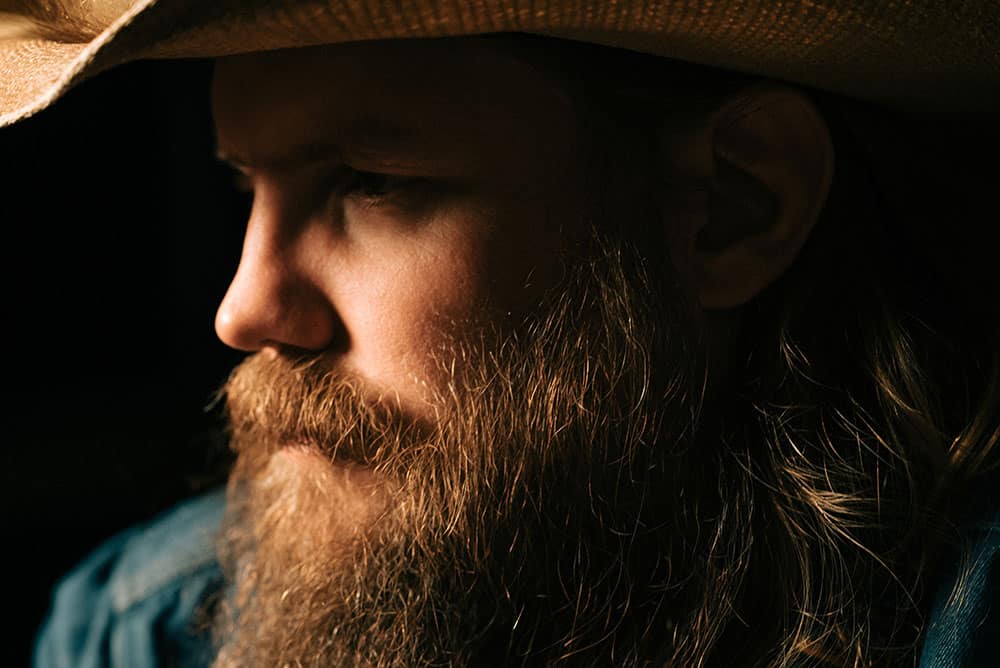
The first time I went through Chris Stapleton‘s fifth album, Higher, I was filled with giddy joy. It’s the kind of joy that comes from witnessing a performer do what he does best: make great, accessible music that speaks to its audience. A (rightly) revered figure in modern country music, Stapleton is a versatile and talented artist who possesses an arrestingly wild roar of a voice and the soul of a rural poet. His songs aren’t just radio-ready anthems to be blasted out of your car radio; instead, these songs are mini-plays, stories of ordinary heroes facing adversity. Though a thoroughly modern country singer, he and his collaborators weave rootsier sounds of his native Kentucky like fine, delicate threads through the fabric of these beautiful, soulful ballads and barnstormers.
At this point in his career, five albums in, Chris Stapleton is regarded as one of our finest singer-songwriters. His last album, 2020’s Starting Over, is a modern classic. Though Higher doesn’t deviate from his sound or formula, he builds on the excellence of its predecessor. Stapleton distinguishes himself from his country music brethren by his insightful songwriting and because he is gifted with the most gorgeous male voice in contemporary country music. He doesn’t sing so much as he soars through these impeccably crafted tunes, finding soul and spirit in the painful ballads or the rousing uptempo material.
Whoever decided to open Higher with “What Am I Gonna Do” deserves a Grammy because it’s a fantastic way to start the record. Co-written by fellow country superstar Miranda Lambert, “What Am I Gonna Do” has Stapleton reach the depths of despair and depression at the prospect of being alone. “What am I gonna do,” he repeatedly sings, “without you”, as he anticipates the pain of heartache with dread and gloom. “What am I gonna be / When you’re just a memory / What am I gonna drink / When I don’t have to think,” he wonders, admitting that he’s “been drinkin’ everything on that shelf / Feels like I’m killin’ myself.” As he ponders life without his love, he imagines drowning his pain in alcohol, the lyrics depressing as all hell.
On the other end of the spectrum of love is Stapleton’s celebration of women in “It Takes a Woman”, in which he pays homage to his woman, testifying, “Whenever I’m broken / Honey, you heal me / When I’m in the dark / You are the light.” Over a thoughtful, shuffling beat, our hero pledges his allegiance to his woman, his soulful wail asserting, “It takes a woman / To be all I can / To feel like a man.” Though songs like this may seem like a dime-a-dozen, Stapleton’s warm, searing vocals elevate the careworn themes, and he’s fashioned a stirring anthem to the love of a good woman. It’s a lovely antidote to the gross, alt-right country ballads that have captured audiences’ imagination and found crossover success; Stapleton’s candid emotion is bracing as he dares to be vulnerable despite his husky vocals.
Other moving moments include the sleek, sinewy “Fire”, a song so light and ethereal it feels like it belongs on a different record. Slightly reminiscent of Wynonna Judd’s classic “Only Love”, the tune moves nimbly on a sweet, simple guitar strumming, and Stapleton – ever the consummate and skillful vocalist – can adopt a lightness to his typically heavy vocals, giving the record a much-needed relaxed sound. A lot of Higher comes off as quite heavy – Stapleton’s muscular vocals, pounding guitars, thudding drums, painfully honest lyrics – that it’s charming to hear him change tactics.
The centerpiece of Higher is the album’s single, “White Horse”, the anthemic country-rocker that sounds tailor-made for arenas or the stage for the CMA Awards. It’s the catchiest song on the record with pop hooks and a memorable guitar riff, and it feels like the most mainstream, though cliched country tune on the album. Though instantly hummable and ingratiating, it’s a somewhat bland song that sounds like much of what’s on country radio now. Even if the music is the least innovative or engaging, it has a terrific instrumental break that’s driving and exciting – but it’s the album’s sole false note.
Though Higher isn’t Stapleton’s most significant work, it still shows off a remarkable and distinct talent. The album is also a prime example of mainstream country rock at its finest. His voice is a multi-hued natural wonder: warm, evocative, pained, and beautiful. It’s a voice reared by the greatest of popular music: rock, country, soul, gospel. He summons up a wide range of emotions and feelings; he’s knowing, cocky, sad, funny. Higher is required listening for fans of high-quality, contemporary country.

